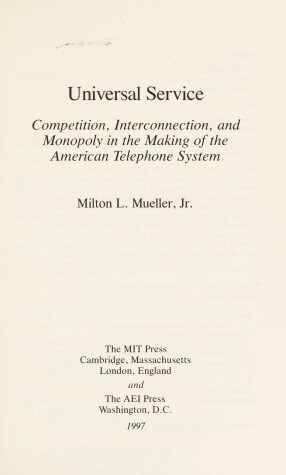Interconnection of competing networks is a critical issue in telecommunications policy. Likewise, the reconciliation of traditional universal service goals (a nationwide telecommunications network connecting as many citizens as possible) with the new paradigm of free market competition is one of the central problems facing regulators. In a work bridging telecommunications policy and history, Milton Mueller shows that much of what we think we know about these subjects is influenced by historical myths promoted by the telephone companies. The book provides a detailed analysis of historical experience with universal service and interconnection. Universal service service entered the vocabulary of American telecommunications in 1907. The universality of telephone communications became an issue in the early 1900s, Mueller shows, because of the existence of competing telephone systems that were not connected to each other. Mueller advances the view that unregulated competition between unconnected telephone networks played a major role in the creation of a universal telephone infrastructure in the United States.
His analysis of this period leads to a fundamental change in our understanding of how and why the American telephone system became a monopoly, the history of universal service, and the economic effects of interconnection.
- ISBN10 026213327X
- ISBN13 9780262133272
- Publish Date 1 December 1996
- Publish Status Out of Print
- Out of Print 17 August 1998
- Publish Country US
- Publisher MIT Press Ltd
- Imprint MIT Press
- Format Hardcover
- Pages 213
- Language English
